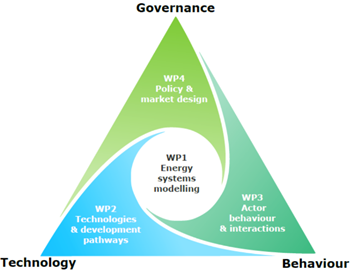Modelling the Whole North Sea Energy System |Rafael Martínez Gordón

Field | Discipline
- Energy modelling
- North Sea offshore grid
Summary
This PhD project is part of a Marie Curie Training Network called ‘’ENSYSTRA (Energy Systems in Transition)’’. The overall network, with 6 universities around the North Sea region, will put together a study of key energy technologies and greenhouse gas (GHG) mitigation options in the North Sea region in terms of (techno-economic and sustainable) potentials, system integration modelling (of the electricity system and the energy system at large), and spatial aspects at different spatial scales (from the European to the regional energy system and their respective interactions). It will include political and social drivers, as well as market and energy infrastructure issues. The network will combine collaboration between different disciplines, modelling arenas and relevant energy industries and regional authorities.
This network and the combination of its expertise, tools and data will provide a diverse and rich learning environment for a pool of Ph.D. researchers, who will be trained in a program with ample possibilities to collaborate between the different projects and partners involved. The ENSYSTRA training network not only targets pressing questions regarding the governance of the energy transition, but it also provides a knowledge basis, methods & modelling frameworks, expert pool and network that will remain important for decades to come. This will be important for the North Sea region, which constitutes the main focus area of this program, as well as for other comparable regions, both in Europe (e.g. the Baltic region and the Mediterranean) and in the global arena.

Energy models have been widely used in the previous literature to discuss, analyze and compare energy systems, as well as for policy recommendations. According to most of these previous studies, during the 1970s and 1980s there was a high increase in the use and development of energy system modelling tools, specially to analyze and understand energy demand and supply interactions.
The North Sea has traditionally been a key player in terms of oil and gas extraction and today around 300 fields, 500 platforms and 10000 km of pipelines can be found. In the future, and as a consequence of policies to cut greenhouse gas emissions, such as the Paris Agreement or the European Commission policies, large deployments of offshore renewable energy sources are expected. This PhD project aims to explore this future interaction between old oil and gas infrastructure and these new deployments.
Together with key partners of the consortium in this project different optimization models including different energy sectors, such as electricity, heat or transport will be developed. The output of these models will help to understand which technologies are cost-effective, what investments in offshore sources are required, and when and where these investments should take place.
Supervision by
-
Promotor Prof. dr. A.P.C. (André) Faaij | Integrated Research on Energy, Environment and Society - IREES | ESRIG, University of Groningen.
-
Co-promotor Dr. P.R. (Paul) Koutstaal | Planbureau voor de Leefomgeving (PBL).
-
Co-promotor Dr. J. (Jos) Sijm | ECN/TNO.
More information and contact details can be found on the personal profile of Rafael Martínez Gordón
| Last modified: | 05 June 2024 4.04 p.m. |
